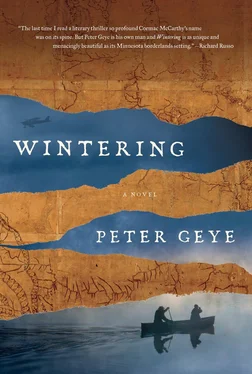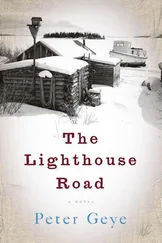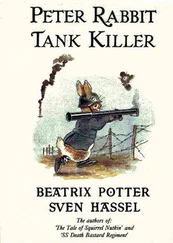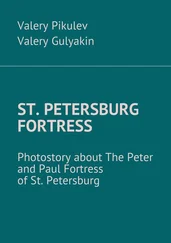I must have looked doubtful.
“When you’re older, perhaps after you’ve had to lie to people you care about, or let go of that which you didn’t think you could, well, maybe then you’ll understand.”
Claire Veilleux left that day with a sympathetic smile. For some twenty-five years I lived with Rebekah and wondered often what Claire meant about all these different truths. When I cared for her in times of sickness, which were frequent, I wondered. As I did when I helped her bathe and dress as she grew feebler. In her last years in the apothecary, I wondered as I helped her to the toilet. When, eventually, her eyes were so bad that I read to her for an hour, sometimes longer, I wondered. And I wondered then, as I read to her and as she fell asleep in her rocking chair, harboring all the feelings she must’ve had, how she could ever sleep. But despite everything we shared, she never once betrayed herself or the past I was so eager to know. To this day — now more than twenty-two years after her death — I do not know what it is to lie to someone I love. And until Harry himself vanished up the river last month, I never knew what it was to let go of something I didn’t think I ever could. And because I’m an honest woman, I can say his disappearance hasn’t brought me one iota closer to understanding Rebekah Grimm. If anything, his vanishing and the stories it has provoked in his son have made her even more of an enigma.
—
I can’t say standing up in that same window these days has lent any clarity, either. And there have been a few such days lately, now that we’re set to begin work on the historical society, a project made possible because Gus’s sister donated the apothecary to the municipality of Gunflint, population 1,201.
It’s been a strange string of ownership for this place. Strange and tangled, as so many things are. The apothecary was sold to Lisbet when Rebekah moved to the Lutheran Home back in the spring of 1963. By any definition it was a slap in Harry’s face that a place he so deplored was suddenly his property. Even if it was only his property until he and Lisbet divorced less than two years later.
Not long after the divorce, Lisbet moved back to Chicago. By then I had moved into a rented house up on Eighth Avenue and on my walks through town I would often pause and stare up at the old apothecary. For years afterward it loomed over the town like some stately and remnant white pine. Paint peeled from the siding. Weeds overtook the lawn. The porch swing fell from its chains. Every five years the plywood over the windows was replaced by Harry or Gus. They must have felt they owed it to the townsfolk to keep what was in there hidden away. And then Signe, putting her estate in order, wiped her hands free of the place, with not a single condition to her donation. She only wanted out from under it. So now it has another chance to become a part of the fabric of life in Gunflint.
Bonnie Hanrahan and Lenora Lemay talked me into helping to curate the historical society, and certainly we’ll do our best. Though to be honest I took their coaxing as a compliment and agreed without needing to think it over for even a second. Perhaps I should have. I’ve been back a few times by now and always feel a kind of presence in here. Please don’t think me a quack. I’m no Gnostic and don’t believe in sixth senses. Still and all, my memories have been especially piqued when I’ve stood up there in the apartment looking out that old pane of glass.
On the last occasion I got thinking that perhaps Rebekah was long past waiting. Maybe she’d spent her time in that high window wanting to jump through it. This thought put a chill right down my spine and left me feeling heartbroken for days. Because, for all of her coldness and eccentricity, I was actually very fond of her. I might even say I loved her.
There were moments when her guard went down, when she entered a room or a conversation as if she’d been delivered into another life that wasn’t smothered by personal history. It’s true those moments were infrequent, but suddenly she could be witty or blithe, even warm. Sometimes they’d come at the breakfast table. She’d recall a scene from the story I read her the night before and she’d laugh. Or maybe it was a story she heard on WTIP that led her to questions. Does this new desegregation law mean the Norwegians and Swedes up here will be forced to walk the same road to school? Eight cents to send a letter? I’d better capture a hawk when they fly through this fall. On the rare instance when she sold a hat, she was moved to something like giddiness. The tone of her voice would change. The tension around her eyes and lips would release and she could smile like a woman thirty years younger. Those moods might last a minute or an hour, but she was lovely then.
I’ve not thought often enough about those happy times, though I found myself reminiscing when last I was up on the third floor. It felt good — quite good — to recall the sound of her laughter. It lingered in my mind and got me thinking about how that window was something like a crystal ball for me. How it looked onto a future that might have been very grim if not for those glimpses of Harry and his fishing boat.
But as soon as the thought of him crossed my mind, I was struck by the notion that Rebekah and I might have been waiting and wishing for the same man.
THE FIRST DAY beyond Burnt Wood Lake was the last of their easy days. The weather was fair, their lungs and legs were fresh, their outfit was complete. The fish were biting, and that night they ate walleye breaded in crackers and fried in oleo, so their guts were well pleased. They were equal on the water, which surprised Gus as much as it did Harry, but he was commended for it. He saw, with every paddle stroke, a stoutheartedness he’d always known in his father but was thrilled to discover in himself. The looming voyage made sense for the entire day. They found the first portage and crossed two more lakes before making camp and finding a long night’s sleep.
Already the next morning the maps proved unfaithful to the country, accounting for fewer and fewer of the lakes and portages, and by the third afternoon on this stretch they were relying more on compass and feel than on charts. The fact that they were lost — paddling shorelines for hours, looking for access into the woods, cutting trail through cedar swamps or pine stands when they couldn’t find any — didn’t seem to alarm Harry. And because he was nonchalant, even confident, Gus put his own worries aside. Until the night the wind came.
They were four or five days beyond Burnt Wood Lake when a squalling, screaming rain ambushed them on what they guessed was Malcolm Lake. They took shelter in the lee of its craggy shore, which didn’t provide much. Whitecaps swamped their canoes. Lightning split thunderheads. Late in the afternoon they found a place to camp along a narrow arm of the lake and pitched their canvas between two trees on the granite shore. With everything too wet for them to start a fire, they ate jerky and crackers for dinner and then hoisted the food packs into a swaying pine before settling in.
All night the wind hollered. The flapping canvas and dropping temperatures made sleep fitful. Twice Gus was shaken wide awake by the sound of a snapping tree. At one point Harry crept from the tent to check on the canoes. When he came back in and burrowed into his sleeping sack he said, “It’s unnatural, that wind.”
The rain relented before dawn and Gus had an hour of peaceable sleep. When he woke, he crawled from the tent and saw his father staring across the lake. Atop the ridge that they’d canoed under the evening before, all the pines had been blown over. Hundreds of trees. Thousands. A mile of trees, felled in a single night. They could have built a lodge from them.
Читать дальше












